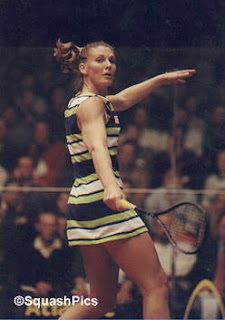It's a perennial favourite of sports pollsters to wheel out their "Who's the greatest?" charts, and I've read many posts where squash fans contribute to similar lists. It's a lot of fun and whiles away many an hour in the pub. The inherent flaw within this speculation, of course, is that many of us aren't old enough to have seen a player from an earlier era in their prime (though I bow to the wisdom of the more "mature" members of the squash community who witnessed Hashim Khan or Heather McKay at the height of their powers).
The inherent flaw within this speculation, of course, is that many of us aren't old enough to have seen a player from an earlier era in their prime (though I bow to the wisdom of the more "mature" members of the squash community who witnessed Hashim Khan or Heather McKay at the height of their powers).
Squash poses an even trickier task for those who try to make comparisons between the overall strength of the professional game in different eras, as it has been dominated by a relatively small number of players; a glance at the previous winners of the British Open is a good indicator of this.
Differing fortunes
The recent announcement of new big-money men's tournaments in the Middle East was announced a few weeks before I read that the 2007 Women's World Open was sadly under threat as the sponsors had pulled out.
This difference in fortune between the men's and women's game had me wondering about the relative strengths of the games and whether overall playing standard and competitive appeal (or, as I rather suspect, a multitude of other factors) is indicative in any way of the contrasting luck in attracting audiences and sponsorship. Another check back at Wikipedia shows that the men's World Open was not held in 2000 or 2001 due to similar difficulties in securing sponsorship for the event.
Another check back at Wikipedia shows that the men's World Open was not held in 2000 or 2001 due to similar difficulties in securing sponsorship for the event.
The current era benefits from heightened competition in that no one player in either the men's or women's game is dominant (though one could argue that Nicol David is creeping towards this position). Greater competitiveness and a sense of unpredictability in sport should in theory attract greater audiences.
Competitiveness doesn't equal increased investment
However, there is an important difference between the strength of a sport as borne out by results and how it is perceived by those who choose to watch or invest in it. Some would rather go and watch one individual superstar trounce his or her opponents week-in, week-out, than back an underdog in a wide-open tournament. It is also unfortunate that women's sport in general receives less money than men's - for example, each summer tennis commentators debate the injustice of women at Wimbledon receiving less prize money than their male counterparts.
It is also unfortunate that women's sport in general receives less money than men's - for example, each summer tennis commentators debate the injustice of women at Wimbledon receiving less prize money than their male counterparts.
I am sure there is a straightforward explanation why the sponsors have withdrawn from the Women's World Open, and I have my fingers crossed that WISPA finds a more than suitable replacement sponsor and venue (maybe in the USA?).
It would be interesting to hear, though, what others felt about the strength of the modern women's game.
Bacteria are eating plastic dumped in the ocean
3 years ago


Today it was announced that women at wimbledon are going to get the same prize money as the men
ReplyDeletehttp://news.bbc.co.uk/sport1/hi/tennis/6385295.stm